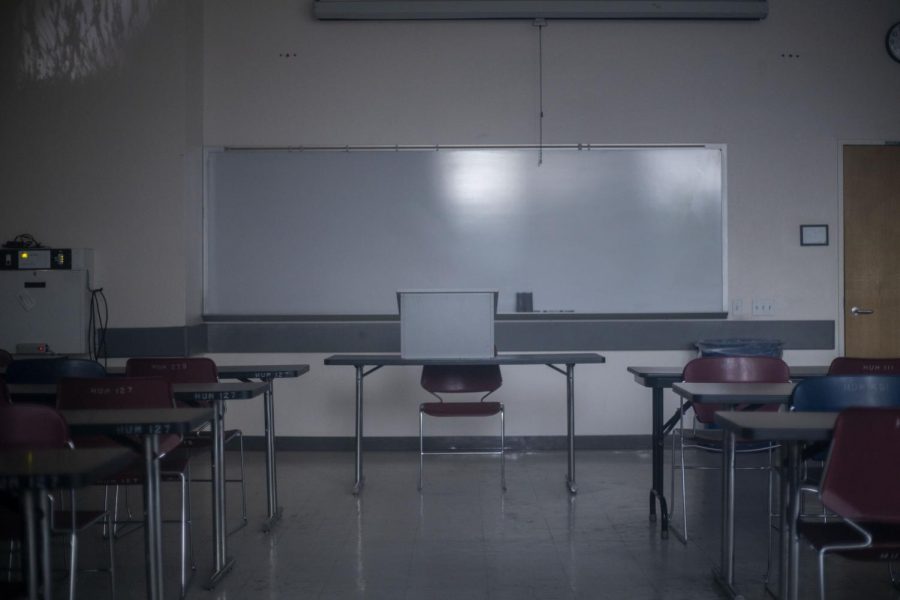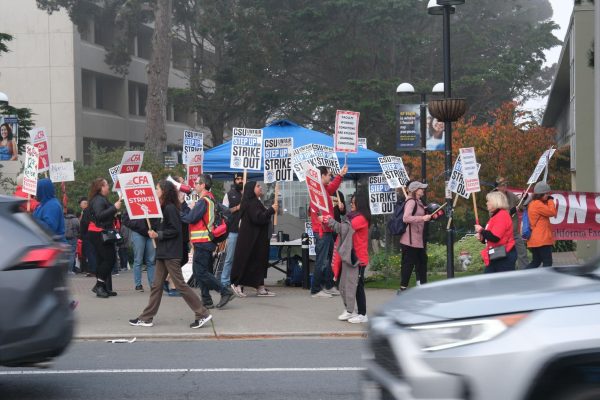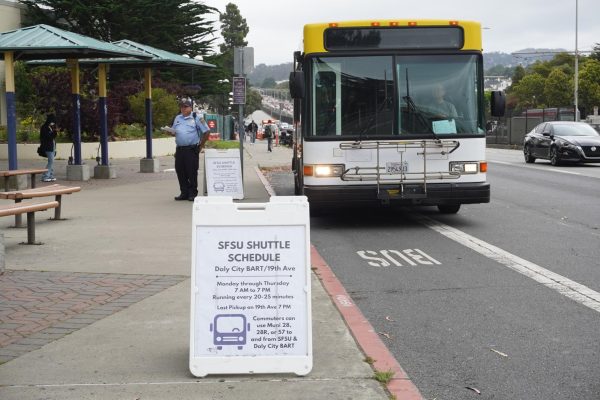1,000 SF State faculty sign petition protesting job cuts
A classroom sits unoccupied during the last week of classes at SF State in San Francisco, California. (Emily Curiel / Golden Gate Xpress)
May 27, 2020
The California Faculty Association (CFA) gathered 1,000 signatures from SF State faculty members who came together to protest job cuts.
“What started our petition is that we started getting reports from lecturers that they were being threatened with losing classes or losing their positions,” said CFA Chapter Lecturer Vice President Ann Robertson. “It’s just a natural tool to use in an attempt to exert pressure on the administration to do what’s morally right for our students.”
The CFA created the petition in response to a looming financial fallout, the likes of which has historically led to job insecurity for many lecturers, who could potentially have classes cut from their schedules. Lecturers are paid per class, and they must be scheduled for at least six units to retain their health benefits.
CFA Chapter President James Martel points out that such a set-up could be especially disastrous during a pandemic. “Fifty-six percent of the faculty are lecture faculty,” he said. “That becomes this kind of reserved labor pool that, whenever there’s a budget crisis, they just cut a whole bunch of lecture sections.”
SF State President Lynn Mahoney said in a statement that she’s not sure how many lecturers will be hired next fall.
“Enrollment levels determine the number of lecturers who are hired each semester at the University,” she said. “SF State already has the lowest student-to-faculty ratio and among the smallest average class sizes of the comparably-sized campuses in the CSU system as well as one of the lowest teaching loads. A further adjustment to class size would reduce the number of classes available to students and could delay their degree progress. Our faculty have great success at teaching classes both small and large. The full impact of the current health crisis on the budget and enrollment totals won’t be known until late in the summer.” To hear President Mahoney discuss the plight of lecturers and enrollment, watch Xpress reporter Juan Carlos Lara’s interview with her.
According to an analysis by the CFA of data from the CSU personnel/payroll information management system, the number of professors has decreased by .4%, the number of lecturers has risen by 8.1%, and the number of administrators has risen by 66% between 2012 and 2018. This rise in administrative officials is the most out of any school in the CSU system, and Martel believes it’s an indicative factor toward the quality of education offered at SF State.
“The union’s position is that the administration has the wrong priorities, its priorities are always itself,” he said. “That impacts the quality of education, and of course that impacts the lives of the lecturer faculty who lose their job.”
College of Health and Social Sciences CFA representative Benjamin Kumli said that he is among many lecturers who have already had classes hidden by their respective departments.
“There’s these hidden sections where it’s not visible to students, you can’t go ahead and register for it on the class schedule, but it looks like it’s on the faculty’s roster,” he said. “Which means that the department is not willing to pay for that class out of its own budget; it’s hoping that the college will do it.”
Abdur Sikder, a business and computer science lecturer, said that two of his sections have been hidden, and he worries that he won’t be able to support his family if he can’t teach these classes.
“My course has enough demand, and all of the students have been enrolled,” he said. “We need to make a point here because this is a very valid point, and this is our livelihood.”
The petition is a step of unification between professors and lecturers, who are coming together with hopes that they can influence the administration.
“For me, it’s a question of principle of solidarity,” said modern languages and literature professor Volker Langbhen. “There are colleagues that have worked five, 10 years as a lecturer, and given the circumstances, this is just unethical.”















Nicole Morrison-Fountain • Jun 4, 2020 at 1:28 pm
Why is it always a cut from the bottom up!?! I see this time and time again where the very foundation of the institute (the faculty and students) budget are cut but never do I hear the top end offer to take a pay cut first in an effort to preserve education and quality faculty.
Lorraine Powell • May 29, 2020 at 7:54 am
Don’t cut the faculty.